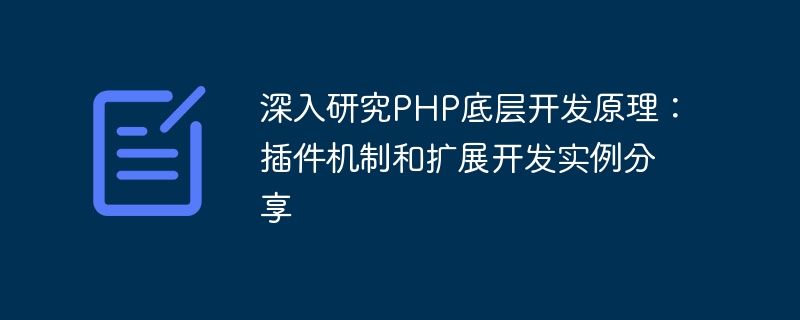

In-depth study of the underlying development principles of PHP: sharing of plug-in mechanisms and extension development examples
PHP is a widely used development language, especially suitable for use in the Web environment Build dynamic web pages and web applications. As a PHP developer, understanding the underlying development principles of PHP will help us better understand and utilize this language.
This article will deeply explore the plug-in mechanism and extension development examples in the underlying development principles of PHP, and share some practical experience.
1. The concept of plug-in mechanism
Plug-in mechanism refers to a way to add extended functions to the system. In PHP, the plug-in mechanism can be implemented by dynamically loading extensions. Through the plug-in mechanism, we can independently develop a certain functional module into a plug-in, and then dynamically load and use it when needed.
In PHP, the plug-in mechanism is usually implemented through a dynamic link library. PHP extension is a dynamic link library written in C language, which can provide a series of functions, classes and methods for PHP programs to call. By compiling the extension into a dynamic link library, it can be loaded and executed when PHP is running.
2. Extension development example sharing
In order to better understand and apply the plug-in mechanism, we can use examples to show how to develop and use PHP extensions.
First, we need to understand some basic concepts and tools. The development of PHP extensions usually requires the help of Zend engine, so we need to understand some basic principles and API of Zend engine. In addition, we also need to use some C language compilation tools, such as gcc, make, etc.
Suppose we want to develop a PHP extension named "example". First, we need to create a C language source file named "example.c".
The content of example.c is as follows:
#include "php.h"
static PHP_FUNCTION(example_hello)
{
php_printf("Hello, world!
");
}
static zend_function_entry example_functions[] = {
PHP_FE(example_hello, NULL)
{NULL, NULL, NULL}
};
zend_module_entry example_module_entry = {
STANDARD_MODULE_HEADER,
"example",
example_functions,
NULL,
NULL,
NULL,
NULL,
NULL,
"1.0",
STANDARD_MODULE_PROPERTIES
};
ZEND_GET_MODULE(example)
The above code defines a PHP function named "example_hello", which will be called in PHP. Through the php_printf() function, we can print "Hello, world!" in PHP's output. In addition, we also define an example_functions array, which stores information about all extended functions.
Next, we need to create a configuration file named "config.m4" for compiling the extension.
The content of config.m4 is as follows:
PHP_ARG_ENABLE(example, whether to enable example support, [ --enable-example Enable example support]) if test "$PHP_EXAMPLE" = "yes"; then PHP_NEW_EXTENSION(example, example.c, $ext_shared) fi
The above code uses the m4 macro language to detect whether the user has specified the "--enable-example" option to enable the extension. If the user specifies this option, the Makefile is generated through the PHP_NEW_EXTENSION macro.
Finally, we use the following command to compile the extension into a dynamic link library and load it into PHP:
$ phpize $ ./configure --enable-example $ make $ make install
The above command generates the configure script by calling phpize, and then generates the Makefile through the configure script. Finally, call the make and make install commands to compile and install the extension.
After completing the above steps, we can use the "example" extension we developed in PHP.
<?php example_hello(); // 输出"Hello, world!" ?>
The above is a simple extension development example. Through this example, we can learn how to create and compile PHP extensions, and how to use extensions in PHP.
3. Summary
By in-depth study of the plug-in mechanism and extension development examples in the underlying development principles of PHP, we can better understand and apply the underlying development principles of PHP.
The plug-in mechanism provides a flexible and extensible way to add and use functional modules. By dynamically loading extensions, we can introduce specific functions at runtime based on actual needs, thereby improving the flexibility and scalability of the system.
Extension development provides us with a means to extend PHP functions. By writing C language code and combining it with the Zend engine's API, we can develop high-performance, reliable extensions and dynamically link them to PHP.
Through continuous learning and practice, we can better master the underlying development principles of PHP and improve our development capabilities and project quality. At the same time, we can also enrich the PHP ecosystem and contribute to the development of the community by contributing our own extensions.
I hope this article will be helpful to beginners, and I also hope that more developers can delve into the underlying development principles of PHP and make their own contributions to the further growth and development of the PHP ecosystem.
The above is the detailed content of In-depth study of the underlying development principles of PHP: sharing of plug-in mechanisms and extension development examples. For more information, please follow other related articles on the PHP Chinese website!




